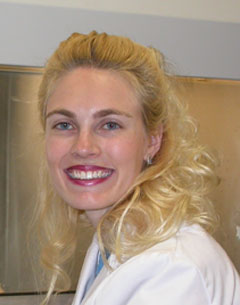ACADEMIA
Nichole Rylander wins national biomedical engineering award
Biomedical engineerMarissa Nichole Rylander,associate professor jointly appointed in the mechanical engineering department andVirginia Tech -- Wake Forest University School of Biomedical Engineering and Sciences, at Virginia Tech is the recipient of the 2012 Y.C. Fung Young Investigator Award.
The Fung Award recognizes young investigators who are committed to pursuing research in the field of biomedical engineering and who have made substantial contributions to the field. The American Society of Mechanical Engineering's Bioengineering Division presents the award.
Rylander, who joined the Virginia Tech faculty in 2006, is conducting novel research in nanomedicine, cancer engineering, and tissue regeneration. Her innovative research combining nanotechnology, laser therapy, and dynamic imaging to study tumor progression and to develop novel cancer treatments led to the National Science Foundation naming her one of its CAREER Award recipients in 2010. She also received the 2008 Outstanding New Assistant Professor Award and the Dean's 2010 Faculty Fellow Award, both from Virginia Tech's College of Engineering, with both awards commemorating excellence in research, teaching, and service.
Rylander "has established herself as a rising star in biomedical engineering. ... Her dedication to her students is shown by her ability to recruit and promote their education as evidenced by numerous National Science Foundation and Fulbright Scholarships," wrote Ken Ball, professor and head of mechanical engineering, and Stefan Duma, professor and head of biomedical engineering, both at Virginia Tech, in their nomination letter of Rylander.
The CAREER grant is allowing Rylander to further develop and use a novel sensing system she co-invented called the "holey scaffold". This patented device is the first system capable of minimally invasive and non-destructive light sensitive, molecular sensing, and control of biological and transport processes within living organisms.
Rylander explained the "holey scaffold can be visualized as a miniature microscope used in conjunction with a living system. The holey scaffold is built from tissue scaffolding and is embedded with a network of hollow microchannels. Typically made from biodegradable synthetics or biological materials such as collagen, the scaffold promotes tissue growth."
She uses the scaffold to measure dynamic nanoparticle mass transport, temperature, cell viability, HSP expression, and reactive oxygen species (ROS) production in real-time within an in vitro tumor in a bioreactor or an in vivo tumor within a mouse. She uses a variety of nanoparticles including carbon nanotubes, novel embodiments of carbon nanotubes and fullerenes, and carbon nanohorns in combination with laser irradiation.
Rylander says her goal is to have her treatment model used by clinicians to determine appropriate nanoparticle properties and laser parameters to achieve selective and effective cancer treatment.
Rylander is the director of the Tissue Engineering, Nanotechnology, and Cancer Research Laboratory and the biomedical program is part of theInstitute for Critical Technology and Applied Science.
Rylander earned her doctorate in biomedical engineering from the University of Texas at Austin in 2005 where she remained as a post-doctoral fellow jointly appointed in its biomedical engineering department and the Institute for Computational Engineering and Sciences.
As a post-doctoral researcher, she worked on the characterization of injury and heat shock protein expression in prostate cancer cells and tumors in response to elevated temperatures associated with water bath and laser heating. Knowledge of the heat shock protein expression distribution in tumors allows the identification of tumor regions with a high likelihood of survival and recurrence. Therefore, therapeutic procedures can be modified to optimize heat shock protein expression to enhance treatment outcome.
Rylander has also developed a course entitled Engineering Approaches to Understanding, Diagnosing, and Treating Cancer for graduate engineering students. This course provides a fundamental understanding of cancer biology requisite to impacting cancer research, knowledge of experimental and super-computational models for understanding cancer progression, and a perspective of the current engineering challenges of diagnosing and treating tumors to inspire new innovative engineering approaches to eliminating cancer.
In addition, Rylander is establishing a multitier education and outreach plan that is integrating research elements and discoveries into multidisciplinary educational and research experiences for high school students and teachers from underprivileged schools in West Virginia and undergraduates and graduate students at Virginia Tech.
